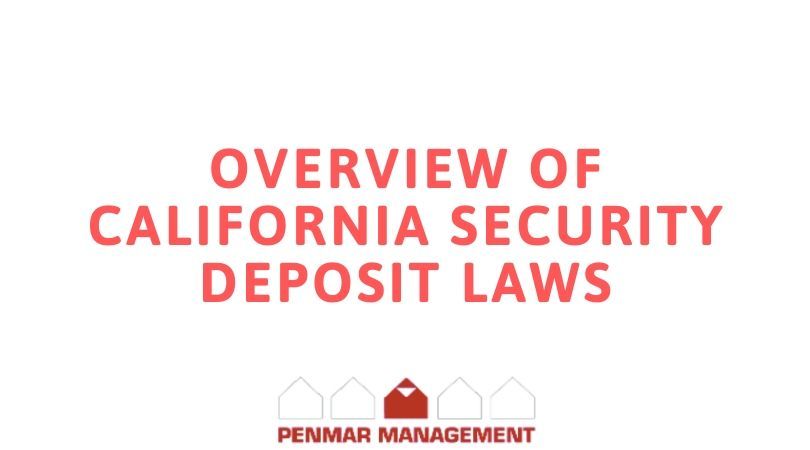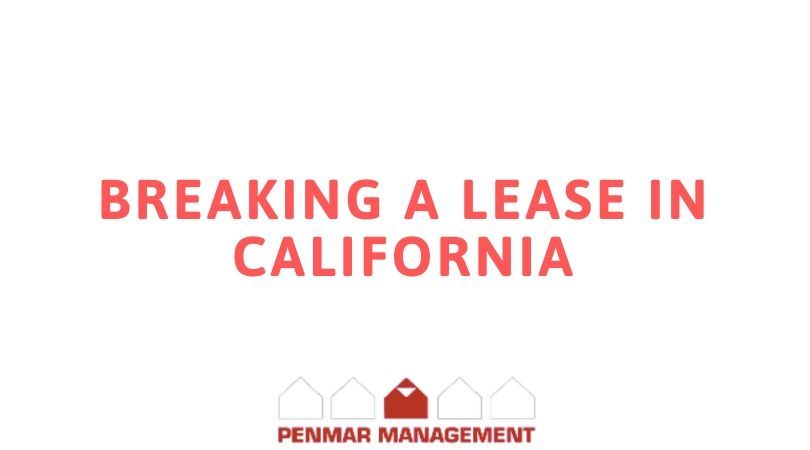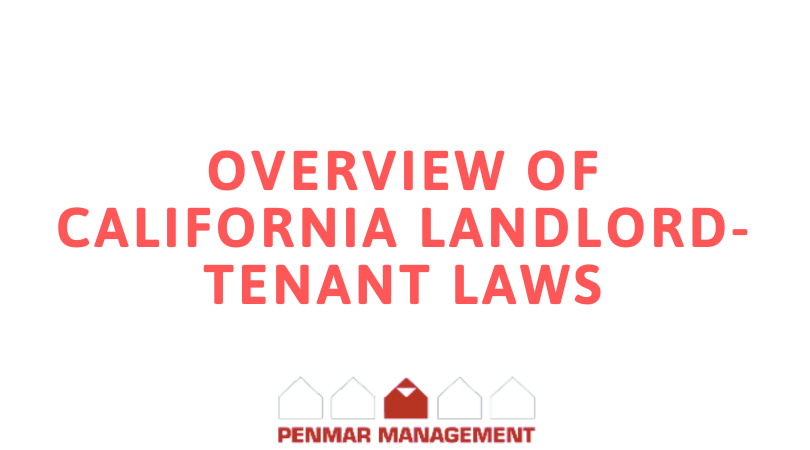If you shop for property management services, you may get the impression that property managers will not give straight, honest answers when asked about their fees. Why is that? Like all businesses, the property manager wants to sell his services at a price where he can cover all of his expenses and still make a profit on his investment. If he was selling bananas, he could figure out his costs, and add a reasonable profit to come up with his desired net income. Then he would divide this desired sum by the number of bananas he plans to sell to get his unit price. When a customer asks how much are his bananas, he can just quote this unit price and the customer is satisfied that he got a straight, honest answer. Why can’t property managers be as straight forward?
Blog Post
California Rental Deposit Laws
Appfolio Websites • Dec 12, 2019
Overview of California Security Deposit Laws
Do you own a property in California or are you a tenant living in one?
It’s important for both parties to understand the laws of the security deposit to avoid confusion down the road.
In this article, we’ll provide you with a simple overview. Remember, if you’re a landlord and would benefit from the services of a professional property management company, don’t hesitate to contact us.
Reasons to Require a Rental Deposit
In California, most residential leases and rental agreements require a security deposit. Landlords require it for many reasons.
1. Excessive Property Damage
A tenant is responsible for covering any negligent or careless damage they cause to the property. Examples of such damages include chipped countertops, unauthorized paint colors, and holes in the walls.
2. Unpaid Utilities Upon a Move-Out
Most, if not all, of the properties’ utilities are transferred over to the new tenant’s name. Should they fail to pay them, the law requires that the landlord deduct the appropriate amount from their security deposit.
3. Cleaning Costs
Most rental agreements require that a tenant return the property in its original state. Unfortunately, not every tenant does this. For tenants who do not, California security deposit laws require that the landlord deduct the appropriate cleaning costs from their security deposit.
4. Missed Rent Payments
Failure to pay rent
is a serious violation of the lease agreement. Should a tenant do so, the law also permits landlords to make the appropriate deductions from their deposit.
5. Lost Rent & Breaking Lease Early
Lost rent can be a result of property abandonment. Abandonment is when a tenant leaves the property before the lease has ended. The most common reason for this is when a tenant is behind on paying rent. They may not want to pay, or they may not have the ability to.
There are also other circumstances that may force a South Bay tenant to break their lease early. This, more often than not, occurs when a tenant needs to move elsewhere to get closer to their new job.
In these two situations (abandonment and early lease termination), landlords have the right to deduct the appropriate amount from the tenant’s deposit.
Guide to California Rental Deposit Laws
1. Security Deposit Limit
Under California landlord-tenant laws, a landlord has two options when it comes to charging a security deposit amount. For a furnished property, the landlord may charge the equivalent of three months’ rent. For an unfurnished one, the landlord my charge the equivalent of two months’ rent.
Beginning next year (January 1, 2020), tenants who are active-duty service members will only be required to pay one month’s rent for an unfurnished property and two months’ rent if the property is furnished.
2. Can a Security Deposit be Non Refundable?
California does not allow landlords to charge non refundable fees.
3. Written Notice after Receipt of Security Deposit
While some states require landlords to notify their tenants regarding receipt of their security deposit, California does not.
4. Walk-Through Inspections
Landlords in California can perform a walk-through inspection. Its purpose is to point out any potential issues and give the tenant adequate time to fix them before the landlord will make deductions from their security deposit.
When performing a walk-through inspection, California security deposit law requires that both landlords and tenants do the following:
- The landlord must provide the tenant with a written notice of their intent to inspect the property before they vacate the property.
- The tenant isn’t obligated by law to agree to the inspection.
- Should a tenant agree to it, the inspection should occur no sooner than 2 weeks prior to the end of the tenancy.
- The landlord must provide the tenant with a 48 hours’ written notice before the inspection date. The notice must state the time and date of the inspection. A written notice may not, however, be necessary if the two parties agree in writing.
- After the inspection, the landlord must provide the tenant with an itemized list of all the necessary repairs that need to be made.
5. Storing a Tenant's Security Deposit
Some states, like Iowa, require a landlord to place a tenant’s security deposit in a separate bank account. Some, like New Hampshire, even require the deposit to be placed in an interest-earning account.
In California, while it’s the landlord’s responsibility to store the deposit, there are no specific requirements for how they should go about doing this.
6. Reasons to Withhold a Tenant's Security Deposit in California
7. How Long Can a Landlord Hold a Security Deposit?
Landlords in California have 21 days to return the security deposit to a South Bay tenant that has moved out. If there are any deductions, then the landlord must provide the tenant with a notice indicating what they are.
In California, a landlord can choose to withhold a tenant’s security deposit for reasons such as:
- Unpaid utilities
- Cleaning costs
- Nonpayment of rent
- Breaking or terminating a lease early
- Damage to the property
Good examples of property damage include broken doors or windows, cracked kitchen or bathroom counter tops, and missing or damaged smoke/carbon monoxide detectors. A landlord can’t, however, charge a tenant for normal wear and tear.
Examples of normal wear and tear
include dirty grout, a few small stains on the carpet, and/or a few small nail holes in the walls from hanging pictures.
The landlord must also provide documents and receipts showing the actual charges incurred. For example, costs of labor and materials. If the repair work is still ongoing, then the landlord must make appropriate estimates to the final cost of the work.
8. Change in Property Ownership
If the property changes hands before a landlord can return the tenant’s security deposit, then they will have two options.
One of these options is to transfer the deposit amount, without any deductions, to the new landlord. The outgoing landlord will then have to:
- Provide the tenant with a written notice indicating the new owner’s name, address, and phone number.
- Notify both the tenant and the incoming owner of the security deposit amount as well as any deductions that have been made and what they were for.
The second option the outgoing landlord has is to return the deposit, without any deductions, to the tenant. Then, the outgoing landlord must notify the incoming landlord of the following things:
- The security deposit amount
- Any deductions that have been taken
- What warranted the move
Whether you're looking to invest in a rental property
or already own one, it's important to understand the legalities of the security deposit laws.
Hopefully this article has provided you with a general overview.
Disclaimer: This blog should not be used as a substitute for legal advice from a licensed attorney in your state. Laws frequently change, and this post might not be updated at the time of your reading. Please give us a call at (310) 326-3424 for any questions you have in regards to this content or any other aspect of your property management needs, which Penmar Property Management
can always help you with.
New Paragraph
Penmar Management
21250 Hawthorne Blvd STE 500
Torrance, CA 90503
(310) 326-3424
info@penmarmanagement.com
BRE #00825088
Areas We Serve
Rolling Hills Estates
Walteria
Golden Hills
South Shores
San Pedro
Holy Trinity
Downey
Lawndale
South Gate
Inglewood
Harbor Gateway
Hollywood Ranch
Los Angeles (Southern)
Contact Us Today!
Thank you for contacting us.
We will get back to you as soon as possible
We will get back to you as soon as possible
Oops, there was an error sending your message.
Please try again later
Please try again later







